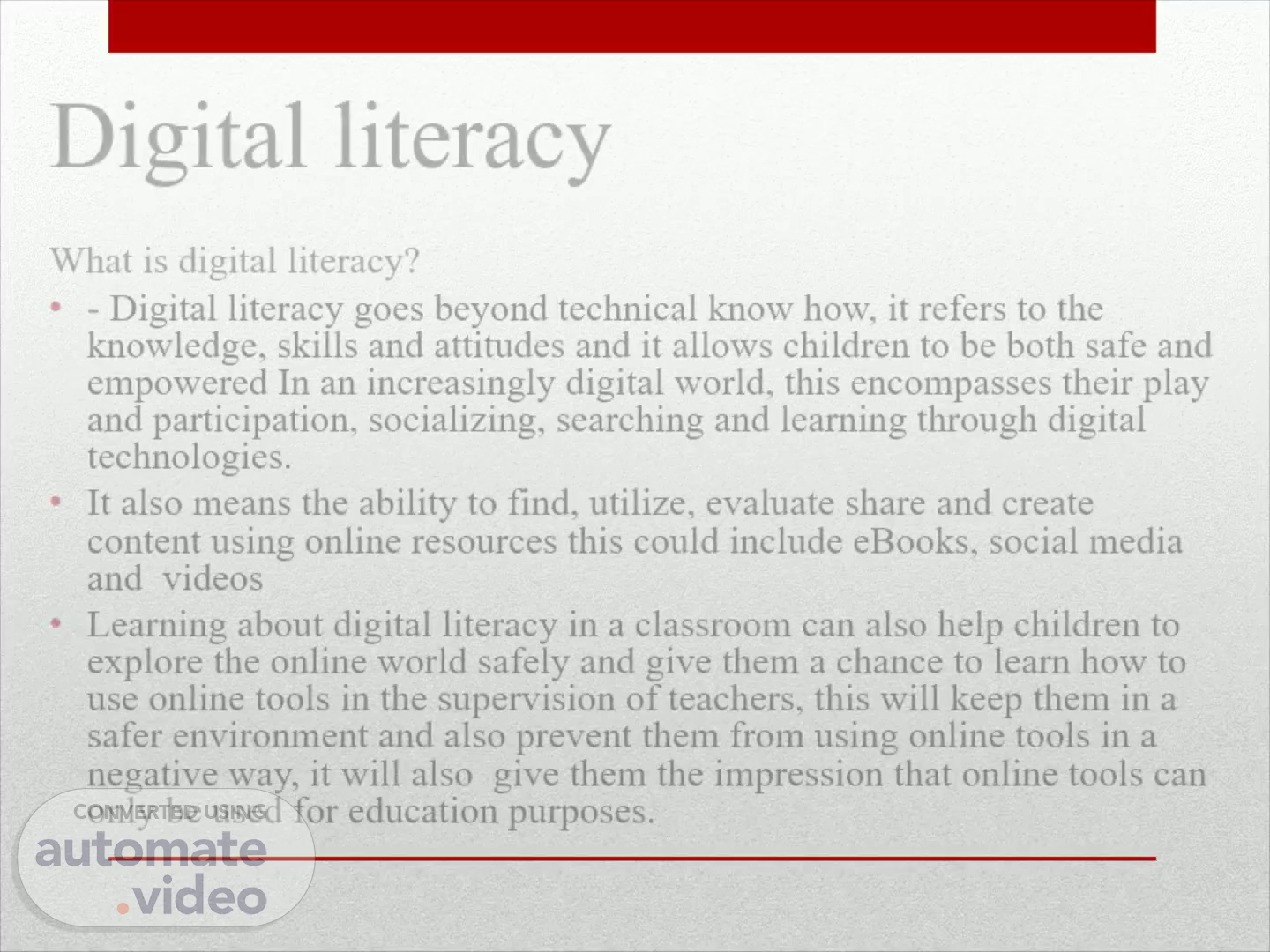Scene 1 (0s)
Digital literacy What is digital literacy? - Digital literacy goes beyond technical know how, it refers to the knowledge, skills and attitudes and it allows children to be both safe and empowered In an increasingly digital world, this encompasses their play and participation, socializing, searching and learning through digital technologies. It also means the ability to find, utilize, evaluate share and create content using online resources this could include eBooks, social media and videos Learning about digital literacy in a classroom can also help children to explore the online world safely and give them a chance to learn how to use online tools in the supervision of teachers, this will keep them in a safer environment and also prevent them from using online tools in a negative way, it will also give them the impression that online tools can only be used for education purposes..
Scene 2 (1m 9s)
Characteristics of 21 st century learners Want to have a say in their education, they will respond better when their voices are heard. They will have a higher level of use in digital literacy than their own parents or teachers, they will have a lot of knowledge. They will also not know how life is without the use of technology. Active students: students learn by doing instead of listening, the teacher is no longer the authority of knowledge, so students should be able to come to conclusions themselves using their critical thinking and creative skills. They will have multicultural awareness and appreciation. This means that learners in this generation is a lot more aware of the variety cultures and other races and this will make students feel a lot more included..
Scene 3 (2m 7s)
Operant conditioning theory Operant conditioning is a theory that is a method of learning that employs rewards and punishments for behaviour. Examples: Offering praise when they do something positive. Providing positive and negative grades for tests. Providing stickers when learners for good behaviour..
Scene 4 (2m 38s)
An example of a technology being used in education is : ‘Language apps’, for example the app dualingo helps learners to understand their strengths and weaknesses. It gives learners tests to understand different languages and support them with different ways of learning languages. Advantages of a language app is that it gives you the freedom of learning whenever you want, you are free to learn whenever you want and wherever you want. -Disadvantages of language apps can be lack of socialising with others, learning a new language can also develop when talking to other people however - when using the app learners can find it a lot more difficult to socialise. There could also be lack of feedback and explanation, for example if you got an answer wrong it could just tell you that you got the answer wrong with very little explanation..
Scene 5 (4m 14s)
In conclusion to this : It is clear that technology has a very big impact on education as it makes it a lot more fun for learners and also allows them to learn in their own paste. Each learner has its own way of learning and technology helps for each learner to learn in their own way. Technology is very useful to both teachers and students. It allows teachers to become creative with lessons to make the lessons a lot more interesting.
Scene 6 (5m 2s)
Bibliography Flavin, B. (2021). What Is Digital Literacy? 5 Skills That Will Serve You Well . [online] www.rasmussen.edu. Available at: https://www.rasmussen.edu/student-experience/college-life/what-is-digital-literacy / Twinkl.co.uk. Available at: https:// www.twinkl.co.uk/teaching-wiki/digital-literacy Creating digital citizens --what is Digital Literacy? Purposeful Technology-Constructing Meaning in 21st Century Schools. Available at: http://purposefultechnology.weebly.com/creating-digital-citizens what-is-digital-literacy.html 3 operant conditioning examples , Helpful Professor . Available at: https://helpfulprofessor.com/operant-conditioning-examples / Mandriota , M. (2021) What is operant conditioning? , Psych Central . Psych Central. Available at: https:// psychcentral.com/health/operant-conditioning Fiona, By and Fiona (2021) The Pros and cons of language learning apps , Viva Language Services . Available at: https://www.vivalanguageservices.co.uk/blog/the-pros-and-cons-of-language-learning-apps /.
